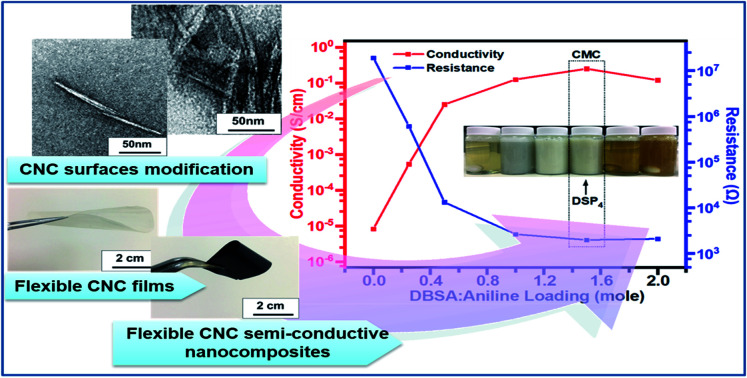- Record: found
- Abstract: found
- Article: found
Enhanced electrical and thermal properties of semi-conductive PANI-CNCs with surface modified CNCs†

Read this article at
Abstract
Cellulose nanocrystals (CNCs) are the most commonly used natural polymers for biomaterial synthesis. However, their low dispersibility, conductivity, and poor compatibility with the hydrophobic matrix hinder their potential applications. Therefore, we grafted sulfate half-ester and carboxylic functional groups onto CNC surfaces (S-CNC and C-CNC) to overcome these shortcomings. The effect of the dopants, surfactant ratios, and properties of CNCs on the thermal stability, conductivity, and surface morphology of polyaniline (PANI)-doped CNC nanocomposites were investigated through emulsion and in situ polymerization. The higher electrical conductivity and well-dispersed morphology of SCNC–PANI 30 (1.1 × 10 −2 S cm −1) but lower thermal stability than that of CCNC–PANI 30 ( T 0: 189 °C) nanocomposites are highly related to dispersibility of S-CNCs. However, after 4-dodecylbenzenesulfonic acid (DBSA) was added, the conductivity and thermal stability of SCNC/PANI increased up to 2.5 × 10 −1 S cm −1 and 192 °C with almost no particle aggregation because of the increase in charge dispersion. The proposed biodegradable, renewable, and surface-modified S-CNC and C-CNC can be used in high-thermal-stability applications such as food packaging, optical films, reinforcement fillers, flexible semiconductors, and electromagnetic materials.
Abstract
Biodegradable surface-modified CNCs were synthesized found high dispersibility and flexibility. Polyaniline-doped CNCs nanocomposites were exhibited high conductivity and thermal stability that may be promising for flexible semiconductors.
